The Age of Exploration, Part Two: Queen Mary Her Royal Majesty, Protector of the Faith and Scion of Aztlan, Queen MaryForeign Contact
Her Royal Majesty, Protector of the Faith and Scion of Aztlan, Queen MaryForeign ContactQueen Mary ascended the throne in December 1349 at the tender age of 16. Given her age and her status as a woman, the country was ruled by a Regency Council in her stead for the first six months of her reign. One courtier from the time wrote that "[the] Queen possesses a frightful interest in the politics of the Council and the running of the country, most unbecoming in a woman."
In June 1350, the British worldview was challenged when evidence of a major, sufficiently adviced civilisation to rival the United Kingdom was presented in the form of emissaries arriving by a light ship (similar to the English caravels) on the Yorkshire coast. The emissaries spoke a completely different language and were of a race never seen before, but their detailed clothes spoke of a well-established textiles industry and they carried swords and longbows of unknown make at the time.
The Regency Council was all set to sink the caravel and put an end to the invaders when the majority of members were arrested on a plethora of charges dating back for months or years that suddenly seemed to spring up overnight. The remaining members fled and, as no courtier was willing to sit on the Council again, Queen Mary took the throne in earnest. She instructed her courtiers to welcome the foreigners, to allow six of their number to travel in a closed carriage to London and to bar any more than twelve of them to set foot on the coast at one time. She also instructed men to keep a watch on the caravel and deny it passage through English docks.
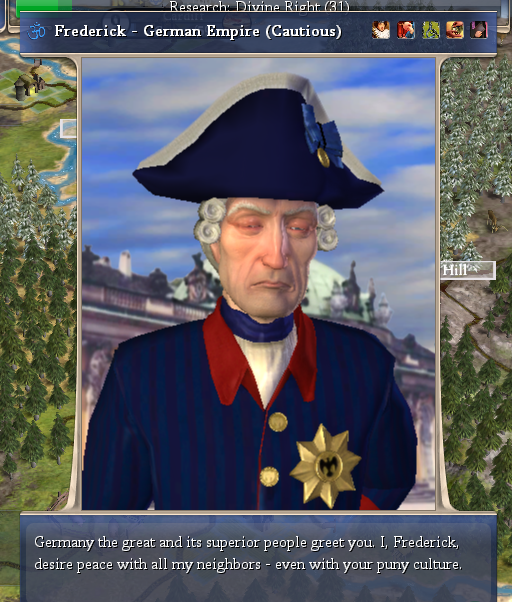 The German ambassador meets the British for the very first time.
The German ambassador meets the British for the very first time.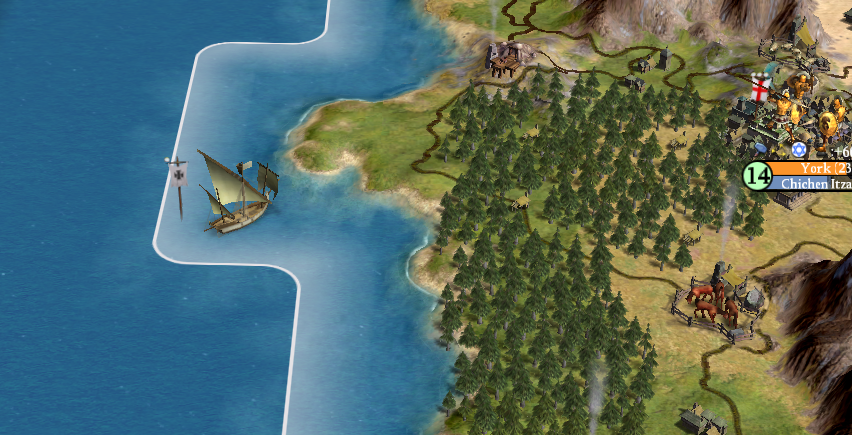 The German caravel.
The German caravel.All this aside, diplomacy proceeded relatively smoothly. Translators on both sides arose to discern the other's language and within two years members of the court were able to speak German with varying degrees of fluency. It soon enough became clear tha the German states followed similar organisation to the United Kingdom; rule beneath a hereditary Kaiser, a vassalised feudal structure and an organised religion based around a faith none of the British had ever heard of; Hinduism. Discussions revealed that unlike Judaism, Hinduism followed many gods in a pantheon, not unlike the religion of early Aztlan. Instead of a system of landed serfs the Germans still relied upon the practice of slavery, which although still legal in the UK was increasingly becoming frowned upon. A small German embassy was allowed to operate in York and the Caravel to resupply by rowboat, but borders were not yet opened to the Germans.
 Alfred Alhazen in his later years.Alfred Alhazen
Alfred Alhazen in his later years.Alfred AlhazenQueen Mary was a keen student of history, particularly of her great-grandfather Robert II. She understood the importance of strength when dealing with others and in light of a potential threat sought to redoubled England's economic strength, favouring the guild system and encouraging tuition of her courtiers and their kin in a wider variety of subjects. Between 1360-1368, her policies allowed massive deforestation in zones not protected by the law to fuel the fires of industry in the cities. Branston and Brickfield saw further development of their guildhalls to the point where the Grocers' guilds (also including the Bakers, Butchers etc) of the cities were powerful institutions, able to sponsor schools, synagogues and the like for their members and further burgeoning the wealth of the two cities.
It is around this time that Alfred Alhazen, a London scholar of Aztec heritage, completed his seven-volume treatise on optics,
The Book of Optics. Alhazen gained much acclaim for his studies, especially in Branston where a relatively minor cult had some following amongst its scholarly class. Alhazen went on to propose the Theory of Vision, do work wtih mechanics, projectiles, geometry, engineering, philosophy, theology and early work on astronomy and what would later give rise to the scientific principle. Alhazen wrote more than 200 books on various subject matters and in 1366 founded an Academy of learning in Branston, stimulating the culture of knowledge within the city for centuries to come.
The Third Thorne Expedition
Portrait of a Young Woman
by Alexandre Cabanel. Portrait of Lady Laura Thorne during her time in the Orient, Age 24In late 1368, an expedition was put together and approved by Queen Mary for travel further than any ship had ever gone before, beyond even the known world. This expedition was headed by the grand-daughter of the great explorer Sir Andrew Thorne, Lady Laura Thorne. Lady Thorne had never met her grandfather (having died before her birth) but had grown up hearing tales about him. Like Sir Andrew whose hatred of merchant banking was infamous amongst mercantile circles, Lady Thorne showed little interest in either continuing the family business or being used for political marriage. It is perhaps a mark of great tolerance for the time on the part of her father that she was even allowed to think or speak of such things, but the presence of a Queen on the throne for her entire life had forced noble society to make some exceptions - at least where rich, powerful and potentially dangerous daughters of banking barons were concerned.
Laura Thorne enjoyed a number of tutors growing up, studying history, the natural world, geography and cartography, optics and marksmanship. One account by a tutor in her early years mentions that she wished to learn swordplay, but no self-respecting tutor would dare bring the tarnish upon his reputation that would come from tutoring a woman. One of Thorne's tutors was Alfred Alhazen, with whom she developed a close relationship and in whose Academy she studied for a year after its inception. Historians differ on how close her relationship with Alhazen was, sometimes citing passages in Alhazen's diaries regarding an unnamed woman that end around the time of Thorne's departure from England. In said passages, Alhazen desribed the woman as 'beautiful, charming and utterly insufferable'.
Talented as Lady Thorne may have been, early accounts of her paint her as no woman of great virtue. Much as her grandfather's penchant for womanising was well known, Laura Thorne was alleged to have been overly fond of strong drink, a proficient but overenthusiastic gambler, a flirt and more than a little downright vain. Some of her father's journals go into length about his frustration of never being able to make use of her in the business for her fondness of wasting the money on dice and cards and never being able to marry because she repeatedly led them on and insulted them.
Given her later career, it becomes apparent that something about the year-long voyage toned down many of her former excesses.
From the Diaries of Lady Laura Thorne12th November, 1368
I cannot believe this ship still floats. The shipyards at Taffeta must have done so much work on the old girl to keep her working all these years but here I am, standing on the Charlotte - just as sturdy as she must have been in my grandfather's day. I tried my hand on the wheel when she got out of port and it feels so smooth to turn. I think I'll let the navigator guide her, though, apparently I set us on course to crash into the coast.
Nobody seems too happy about a woman being aboard ship. Bad luck, they say, though they wouldn't say it to my face. I am the money, after all. Still, that's the reason for bringing Gareth and Charles - I don't want any misunderstandings and two six foot tall burly men can send that sort of message well enough. That and I packed Old Harry with me, in case of pirates on the way out. He's only a light model, I wish I could have brought Bernard (Father's heavy scorpion) but I can barely lift the thing sometimes, let alone winch it back.
5th February, 1369
Lost a bit of money on the dice today, gained a bit on cards. Total loss, but it's fun. Had dinner with the chaplain again, John. Lovely young man, but he's hopelessly weak. Not to mention a man of G-d - tempting, but not worth the hassle. I picked him because he's a Godwinite, vow of chastity and all. Gives me someone to talk to who won't get the wrong ideas.
Gareth is showing a lot of interest in John, actually. I do wonder about him, sometimes. Still, I guess the world is full of all sorts.
Storm last night, subsided. The men did good work keeping the ship together, so an extra ration of dried meat and whisky for everyone today. Already sick of ship biscuits, but I'm told tolerance comes with time. Dear G-d I hope so.
9th April, 1369
I swear Smith is cheating, what with there being five of a kind in that last game. One of the men tried to get familiar again, had Gareth pick him up and put him down again somewhere else. He got the message. I can hardly blame them, though - it might be months before we hit land or they see another woman. I just hope I don't have to crack out the lash to make a more obvious example.
We had an overflight of some sort of large gull today. It's a bit of a waste or quarrels, but I was getting sick of fish so I took three shots with Old Harry and brought one down to much applause from the men. Turns out they were sick of fish too. The bird's a bit greasy, but we stewed her and the flavour has done wonders for morale. Put Old Harry back in the cupboard with the quiver for now, it's not really fair to waste shot like that.
John made a rather clumsy attempt to kiss me today. I guess that whole 'vow of chastity' thing isn't as strong as the Godwinites would have us believe. I turned him down in no uncertain terms. He's hurt, but hopefully he'll recover.
8th June, 1369
Halved the whisky rations, we're down to three months. Not popular with the men, but I doubt no whisky will be popular either. Ended up getting into an argument with some of them, Gareth and Charles had to break it up. Get the strong impression I've lost some respect there, but they can just take it. I'll need to decide soon whether we should turn back, there's been no sight of land at all since we passed New Scotland.
Kind of ironic, given I have my own bottle hidden away beneath the bed. Best not let the men find that out. John's being a prick lately, little comments and such amongst the crew. I swear he's going to be trouble.
25th June, 1369
One of the crewmen broke into the stores and drank quite a bit of whisky. Had him hauled out to be flogged, but none of the men would do it. I think John told them about the bottle in my office. I had Charles take care of the whipping in the end, but none of the crew seemed keen to return to work. I threatened more lashings before they left.
Strangely enough, nobody wants to play cards with me any more.
8th July, 1369
John came into my cabin just now, told me he was speaking on behalf of all the men. Told me it was time we turned around and went home, and if I wasn't happy with that then maybe I shouldn't be in charge. I told him I'd consider it, then asked him to leave. I think I'm going to have to call Charles and
9th July, 1369
It's a mess. Gareth's dead, two of the crew and dead and a lot more are injured on both sides. We barely have enough to guard the men in the makeshift brig, let alone crew the ship.
Shortly after John left, I heard the shouts. Charles came into the room and told me they were coming for me; he had his knife drawn already. I grabbed Old Harry from the cupboard and my quiver and cocked him. Charles asked me what I planned to do, and I realised for the first time that I was expected to be coming up with plans. Well, it hit me that the first stop the men would make would be the whisky store to get courage, and only then would they think about hitting the armoury. Charles and I ran down into the hold and got there to find three of the men already armed with swords.
Thank G-d, they were still loyal. One of them threw me a sword, which I still have no idea how to use (thank you for that, Father!) so I started keeping my crossbow cocked at the door until I realised they actually needed me to lead them. I told two of them to keep guarding the armoury whilst Charles and I moved out ahead to meet the mob when it came. I think a lot of them thought twice when they realised the girl they were going to beat down on was standing up, aiming a crossbow at them and in control of all the weapons.
I have no idea how I managed it, I think it was something about the way I said it that worked. I remember the way Father used to talk to the lesser clerks or the servants, how it wasn't kind but they still followed orders because he always seemed to know what he was doing and what the score was. Maybe it was that. I told them that I was in charge and that that was not changing. I told them that I was a servant of the Queen, and to stand against me would be to stand against Britain. I told them I would give each of them once chance to come over to my side and escape the punishment that would be coming if they did not.
Some of them actually crossed over. Granted, not the majority I had hoped for, but it gave us a chance. John was there at the head of the other side, and I could tell he had roused most of them. He started trying to offer a speech of his own when the real force behind the mob stepped forward and charged. Gareth. Gareth had betrayed me.
I felt precious little remorse when I let loose the bolt that hit him in the chest, and for a moment the only sound was his gurgling, then the thud as he hit the floor. That's when we loyalists started fighting a retreat back to the armoury. The fight was vicious, bloody, and it was a bloody miracle I got out of it with only a broken arm - and not even my writing arm to boot. My men back at the armoury came out with more swords and tipped the scale, and soon enough the rebels were surrendering. We forced them into a part of the hold we quickly converted into a brig and chained the door shut. We've shifted the dead up to the deck for now and those of us with steady hands have been assisting the ship's carpenter in surgery on the wounded.
10th July, 1369
Three more of the men died, but the rest seem stable enough. John refused to say the rites for them, which shocked me from a man of the cloth. I am starting to believe he has gone mad with rage. I performed the funerals myself before we laid them out to rest at sea and I do regret their passing, even Gareth's. We need crew to keep the ship going, though, and I must decide how to deal with the remainder of the men.
12th July, 1369
I had the whisky keg brought in to the brig where the men were all sitting, hands bound. I showed them the whisky bottle, full and the seal on the cork unbroken. I opened the bottle and made of show of pouring the whole of its contents into the barrel. I told them that I struggle as they struggle, that we have all suffered, but that if we cannot operate as a ship we will fail and we will die. I told them that I can use loyal crewmen, but I have no room on my ship for the rebellious.
So I gave them an offer. Swear an oath to the Queen, to Britain and to me to serve. They were to receive the freedoms they had before, but I would take each of their little left toes to remind them of the price of disobeying me, and that I would take something more precious to them if they did so again. All but one swore and lost a toe as punishment.
John. Whatever shall I do with you?
15th July, 1369
I feel very uneasy about it, especially a holy man, but I can see no other way. If I free him, he will oppose me at every turn. If I imprison him, he can still speak to his gaolers and turn them against me. I cannot send him home, I cannot afford to feed him, and I cannot spare a rowboat and supplies in the hope that he will make it to a shore.
16th July, 1369
It's done. I read out his rites while he was there to see him, and pardoned him in the name of G-d and the Queen, and then we clubbed his head and forced him over the side. Better than letting him swim for hours before drowning, that it come suddenly and him unaware. There is a great tightness in my stomach over it all, a sense of unease. Did grandfather ever have to take measures such as these? I hope not, for his sake.
They may still dislike me, but the men fear and respect me now, and a captain doesn't have to be liked. She has to be obeyed, for the good of the whole ship. That said, I'm having Charles train me with the sword now.
6th February, 1370
The spotter has sighted land. There is green on the horizon, and it stretches a fair way in either direction, so we are on course for more than an island. We'll approach and see what it holds.
Afternoon of the same day.
Ships! Not as big as ours, they look like sailing boats and they're full of these little yellow-skinned men, but ships! We've sighted a harbour as well, so we're going to try and aim for it.
7th February, 1370
What a day. Not surprisingly, as soon as we reached the harbour we were greeted by a cadre of longbowmen and swordsmen, so we stayed aboard ship and they shouted at us in a language we could not understand, probably to surrender. Some of the men shouted back, and predictably they could not understand us either. I managed to dissolve the tension somewhat when I tried speaking in German instead; looks like they've met our erstwhile ambassadors before.
I came down with four of my men and left the rest on the ship, now that we had worked out a common language to speak in. Having explained our situation as peaceful explorers, my party and I were whisked away to what I can only assume is the capital of their country; China. What luck to have landed here, of all places! We travelled through well-tilled fields and well-kept roads, then through jungle and eventually to a managed forest before reaching the city itself, a thriving expanse on the level of Nottingham or Brickfield. The architecture here is unique; I can see some very superficial resemblances to Confucian designs, but only in the way that a vulture is the same as a sparrow.
We were brought to the palace of their Emperor, using the closest German equivalent, a man perhaps anywhere from his twenties to his forties (it is so hard to tell with this race) with an impressive long thin beard and wearing robes of what I can only assume is a form of very soft, very impressive cotton, richly dyed and with cloth of gold sewn into it. The Emperor, whose name I think is Ming, asked us some questions in fluent German about our mission, where we had come from and our intents. I replied that we had come from the distant island nation of Britain (technically true, if you count a continent as an island) and that we were seeking new lands and new peoples to trade with and learn more about.
The Emperor took a long time thinking about what I had said and at one point an advisor of his tried to speak up, presumably to offer his advice, but Ming signalled for him to be quiet. When he had finished thinking, he told us that we were welcome as guests in our lands if his own emissaries would be welcome in ours. Not really being able to ask anyone back home, I accepted. I think the Queen will understand.
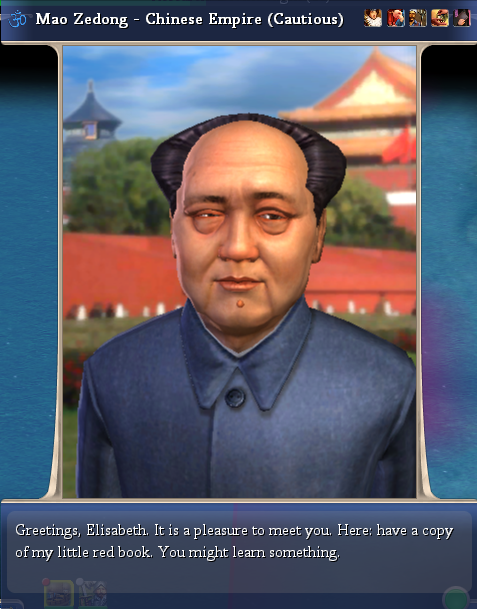 Emperor Ming's chief mandarin meets the expedition.
Emperor Ming's chief mandarin meets the expedition.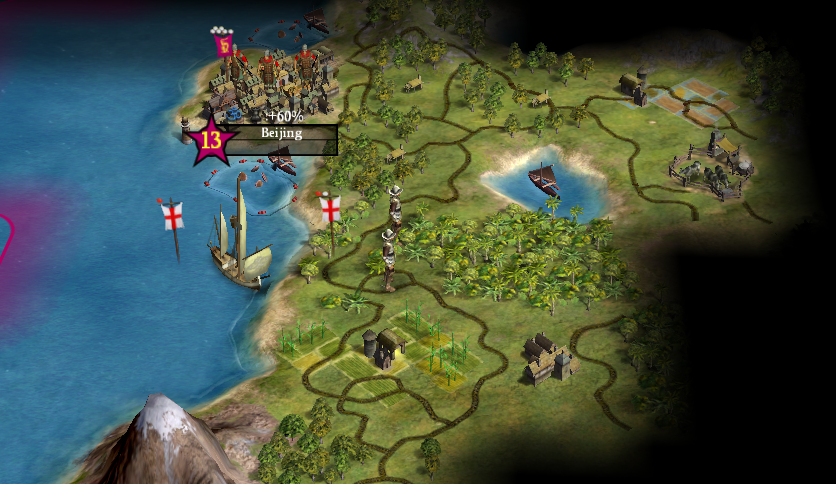 The Charlotte lands at Beijing.
The Charlotte lands at Beijing.27th April, 1370
Nearly three months in Beijing now. Fantastic city, and I am finally getting the hang of Mandarin, the imperial speech. Turns out they have at least a dozen different dialects around here. I shouldn't be too surprised; sometimes I can barely understand what Yorkshiremen say. They have street vendors here, as in London, and I have been trying different kinds of food wherever possible. I have composed a report home on what we have observed and now that the crew is refreshed those not inclined to stay with the new embassy will return home, carrying our Chinese counterparts.
We have much in common with China. The Emperor inherits by succession, as with our Queen, and various provincial lords operate under a system of vassals. The well-tilled fields we passed through are maintained by landed serfs as back home, and they follow an organised religion of the same type as the Germans; Hinduism. Despite a difference in religion, the only real difference to us is that they lack the advantages of our system of guilds; it is difficult to get standardised equipment here. Similarly, they lack the ordered government to produce a standing army of macemen or the machine knowledge to produce crossbows, but their longbows are suitably impressive and they train with them regularly. Nevertheless they are militarily inferior, so given our similarities I have recommended to the Queen to develop stronger relations with them to our ultimate benefit. If we should ever need to establish a foothold in this land, we might need allies.
9th May, 1372
I had my first official meeting with the Spanish ambassador, an utterly dislikable woman of the worst kind - a zealot. The Spaniards it seems are not only Hindus like the Chinese and Germans, they are the founding country of the faith and utterly devout as a result. As far as I can tell they live in some sort of G-d forsaken ice-hole to the north, which sounds suspiciously like Wales. What is it about cold, inhospitable places that seems to give rise to dominant religions?
The Spaniards follow a vassal-based heirarchy as we have come to expect, but they lack the stability of an inherited throne. As far as I can tell there must be periodic short, brutal wars of succession every time one of their rulers dies or else they must be individually nominated by the last ruler and supported by the feudal lords. They employ serfs over slaves like the Chinese and their Hindu church is strictly organised but surprisingly not to the point of exclusion, and they lack any particularly developed economy.
I cannot say I like or approve of the Spanish if the attitude of their ambassador is typical of their people, and I get the impression the feeling is likewise. I will recommend avoiding outright conflict with a power that holds such influence over our existing contacts for now, but I fear it may come eventually.
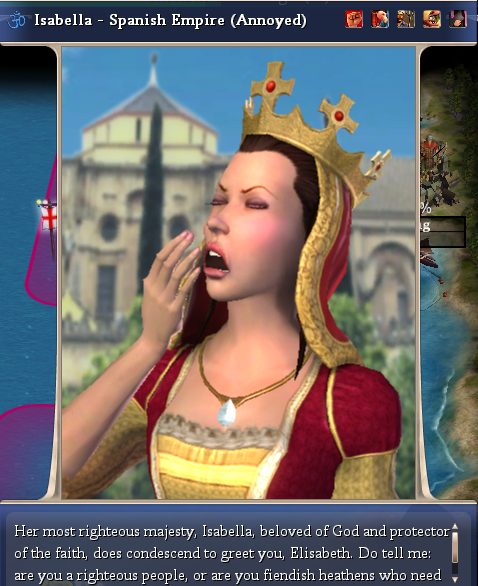 The Spanish prove difficult to relate to.
The Spanish prove difficult to relate to.23rd August, 1374
My slow tour of China is progressing southward and I am forever astounded at the sheer range of food available in this country. There is a kind of corn called maize, which resembles wheat but with much thicker and fleshier grains; a sort of reed or cane which is as sweet as honey, without the hassle of bees; a fleshy sort of jungle fruit called a banana, which is bright yellow when ripe and the skin can be peeled away like an onion's top layer to reach the flesh below; and in particular large herds of what they call a cow which is somewhat like a cross between a pig and a horse and gives milk in the manner of goats. I have asked to send samples of all these fruits and meats back to England for Her Majesty's court.
The Chinese seem to be concentrated in three primary states on the coast, all focused around large, well-developed cities; Beijing, Shanghai and Nanjing.
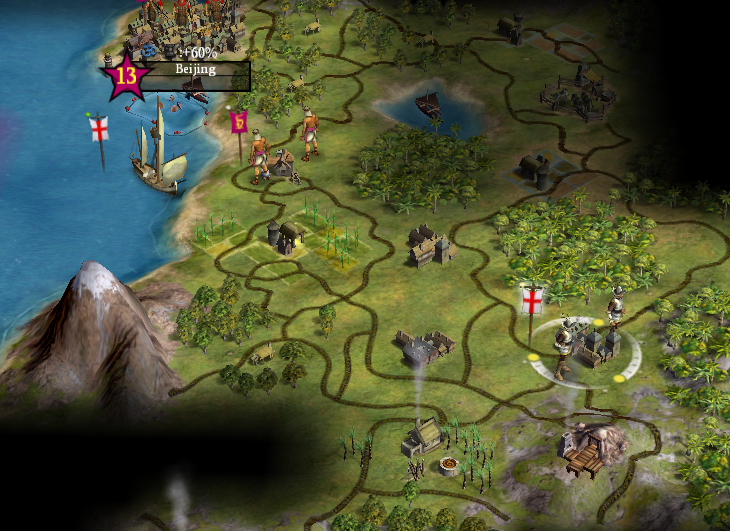 The wide variety of foodstuffs found in China.
The wide variety of foodstuffs found in China.9th September, 1374
I met with the ambassador of a nearby nation called Arabia today, bordering China to the southeast. The Arabs practise a different religion to the Hindus, Buddhism, and Arabia is its founding country. Buddhism bears some similarities to Confucianism in that whilst it recognises the existence of the Hindu gods it places far more emphasis on personal development and spiritualism. Nevertheless our clear differences in faith will sour relations, as the Arabs appear to be as devout as the Spaniards. To the credit of the Arabic ambassador he was far more polite in his manner than the Spanish diplomat managed and we were at least able to maintain somewhat civil discussions.
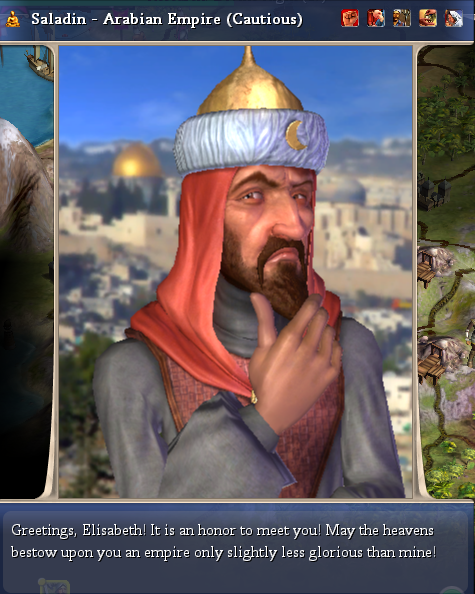 The Arabic ambassador.
The Arabic ambassador.8th May, 1376
I am feeling much at home with the Russian ambassador, who can hold his drink surprisingly well and has been introducing me to some of the dice games of his country. We were treated to a cavalry display by the Russian ambassador, conducted through a game called 'polo' which is likely to be of some interest to our horsemen back home. It turns out that they did not invent the game themselves but inherited it from another empire far to the south whom we have not yet met; the Golden Horde. The ambassador is not really willing to talk specifics about his homeland (and neither are we) but we have learned that they follow the feudal structure we have come to expect in this part of the land and approve of our own feudal tendencies.
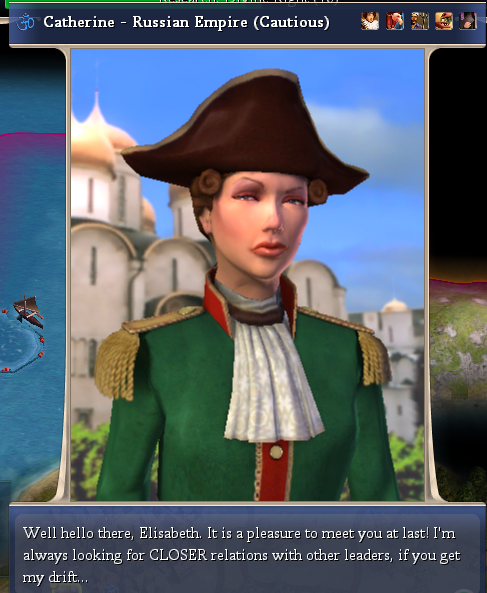 The Russians prove somewhat welcoming.
The Russians prove somewhat welcoming.9th October, 1376
The Russian ambassador introduced me today to his counterpart from the nation of France. As is swiftly becoming common, a feudal system under Buddhist government. They bear a stronger resemblance to the Germans than any others I have seen yet, suggesting they may have once been the same people. The French ambassador, who is rather quite charming, has offered to take the embassy on a tour of France.
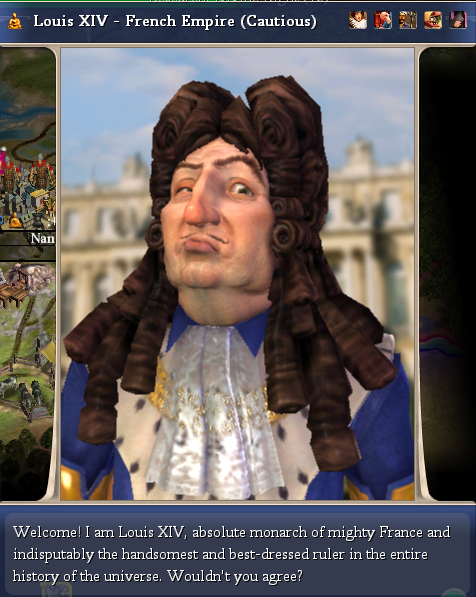 The French ambassador.
The French ambassador.20th October, 1376
We have set up a temporary embassy here in Chengdu; I have left someone to act in my stead in Beijing for now. The first thing that strikes me about this city is its strong resemblance to those of China, especially with the older buildings. I ask and my guide confirms that France and China have indeed been at war in the past but are presently on good terms with one another. Given the size of the city I can only assume it has either been under French government for many decades or it was as large as the other Chinese cities when it was taken.
The ambassador tells me that when summer is over (and the idea of summer during October is very strange) he will take me to Lyons, the largest city in their kingdom.
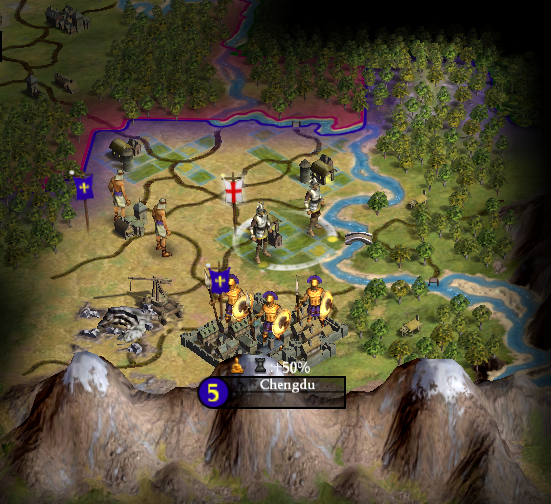 The Franco-Chinese border near Chengdu.
The Franco-Chinese border near Chengdu.2nd February, 1382
Lyons, Chartres and now Paris! We were taken to see the temple of an ancient prophet or soothsayer, the Oracle, from centuries ago. I readily confess that our six year tour may seem leisurely, but we have spent much of it carefully mapping out the territory of France for our dispatches back home. Of particular interest to those back home will be the wide variety of spices encountered here, used much in Oriental cooking. Also the native fruit, the grape, which grows readily in the French plains and is pressed and fermented into a drink they call wine that often puts beer and sometimes whisky to shame. I have taken somewhat to the distilled form of this drink, brandy, which is served in large goblets to allow the smell to circulate before drinking.
To the north my counterparts have been allowed to explore along the coast of Russia, where they have noted two large ports of interest; Yekaterinberg and Rostov. Near Rostov, whales are regularly sighted in what appear to be breeding grounds and they have made something of an industry of their capture for meat and blubber. There are rumours that somewhere within Russian lands is a great library devoted to the collection of all the works of knowledge in the continent.
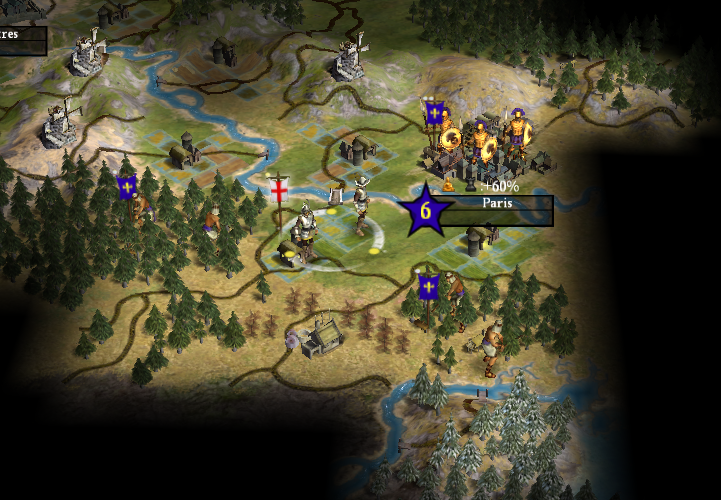 Paris and the River Seine.
Paris and the River Seine.8th December, 1386
A package has arrived that has changed the course of our mission here.
A map.
Paper and ProsperityWhilst the Third Thorne Expedition was conducting diplomacy in the Far East, the German embassy finally secured an open borders agreement with the UK for their emissaries to travel beyond the initial restrictions of the embassy. Given the Thorne Expedition's presence near possible German soil, the court at the time judged it prudent to open as many doors as possible and sent word to the Orient for the embassy to secure similar agreements with as many nations as possible. Eventually only Spain and Arabia would decline due to their opposition to the Synod.
In 1376 the Old Aztec-inspired temple of Chichen Itza was completed in York. Originally intended to be finished for the 25th anniversary of Queen Mary's coronation, Chichen Itza's construction was delayed due to a lack of funding and completed two years after schedule by a new backer, a former military advisor to the king. Although military matters were now mostly concerned with piracy, the existence of other powerful nations had been known for over twenty-five years by this point and soldiers had wisely begun to train in old ground combat techniques in anticipation of possible warfare. Chichen Itza was used both as a temple and a military academy in which soldiers and captains were schooled in the philosophy of defence. Itzan tacticians became reknowned throughout Britain both for improving existing defences and establishing new ones. The development of a trained soldier class fundamentally independent from feudal obligations (beginning in its first true form with Itzan tacticians) laid the foundation for military reforms in the coming century.
1380 saw the rapid expansion and dominance of Harkuf's Branston and Brickfield, symbolised in the construction of the B&B's central vault and banking house in Brickfield, commanding finance almost without rival across the whole of Great Britain. The B&B continued to sponsor ventures across the country, leading to one of their greatest successes; the Paper Mill of Hanno.
George Hanno was a merchant and a manufacturer of papyrus, parchment, ink and bound books for scholars across the continent. In 1386 he established in Taffeta a mill for the production of his greatest invention - Paper, a commodity we take for granted now but which upon its invention exceeded all of its competitors in price of manufacture, strength and longevity. Cotton alone suffered difficulty keeping ink, papyrus was prone to crumbling, as was parchment which suffered fading of ink over time. Stone and clay were simply impractical for everyday use. With the advent of paper, a medium created from wood pulps mixed with strands of cotton for strength (Hanno's chief contribution to the composition), writing and accountancy across the world would be revolutionised with a cheap, plentiful and stable medium for the recording of information.
One such application was the creation of maps. The German ambassadors, seeing some of the new maps brought to show the court, were very impressed and claimed that if they had access to such a material their own maps would be much improved. Although the secrets of paper themselves were not offered, a furious negotiation took place thereafter between the embassy and the Royal College of Chartered Cartographers. The German embassy expressed great interest in the organisational structure of the guilds and ordered civil service of Britain, but both were deemed too militarily important for trade. The ambassadors were particularly impressed by the culture of music and drama in Britain and after much deliberation finally agreed to provide full and extensive drafts of their own maps in exchange for sending a team of musicians and playwrights back to Germany to teach their own people the ways of British culture.
The information received saved decades of exploration and quickly alerted the British to the existence of a supercontinent even larger than their own. The existence and locations of three new empires were revealed; the Golden Horde, Persia and Mali, bringing the total number of known nations in the world to ten. Although power on the supercontinent certainly seemed balanced enough, the threat of a single nation able to rival English supremacy was apparent should these countries ever join together.
After consultations with the Oriental embassies it became clear that two names for the supercontinent were popular amongst its residents; either Europa or Asia. English mapmakers thus titled the continent Eurasia thereafter.
With the knowledge that the world could be encircled completely by ship, definitive proof was finally obtained for the ancient belief that the world was shaped like a sphere. A revolution in nautical engineering would arise from this that would forever cement Britain's superiority on the seas.
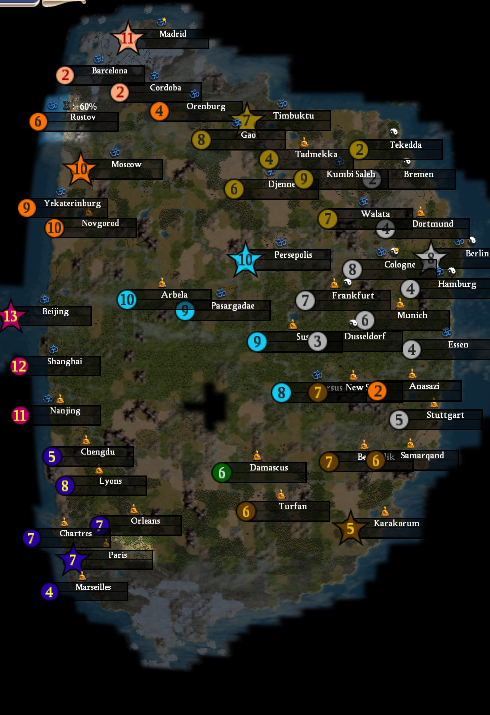 A copy of the original German maps of Eurasia as presented in the exchange of 1386.
A copy of the original German maps of Eurasia as presented in the exchange of 1386.With 1390, we hit the 1 year/turn segment of the game. Even if this does not increase any further, this means a good 650 or so turns remain of play.
Also, 'circumnavigating the globe' gets us a permanent +1 to ship movement. We did not actually circumnavigate the glove as such, we travelled to Eurasia and hit the western coast, but as the Germans had come from the eastern coast it completed our map of the world and counted for the purposes. I suspect that had be actually shared our map for theirs, they might have managed the achievement first.
The End of an AgeQueen Mary's reign continued for a further thirteen years, during which time the country continued to prosper financially and in terms of population - the newly formed Grocers' guilds in Edinburgh reported in a private statement in 1394 that the city's population exceeded 3,270,000 people.
The Thorne expedition officially met the Persians at the border of their lands, deep in the heart of Eurasia. A Buddhist state, what intrigued the Thorne expedition most of all was their representative system of government in which the various lords of the land made decisions in a united assembly rather than the unofficial politicking that ruled the English court. Thorne was granted passage into the city of Gordium to meet with officials where in addition to the now-familiar bananas the emissaries were greeted by the terrifying and astounding sight of elephants. Thorne wrote in her report;
"A huge beast, taller than three men on one another's shoulders and as thick as a house, it flaps its ears madly when angered and sports great white teeth that sprout from its mouth as spears. Most pecular is its nose, as long as its legs, which it uses to suck up water from ponds and deposit the fluid in its mouth. I have seen men ride these on high saddles and hear tales of their use in war. I can only imagine how terrifying such a beast must be in combat."
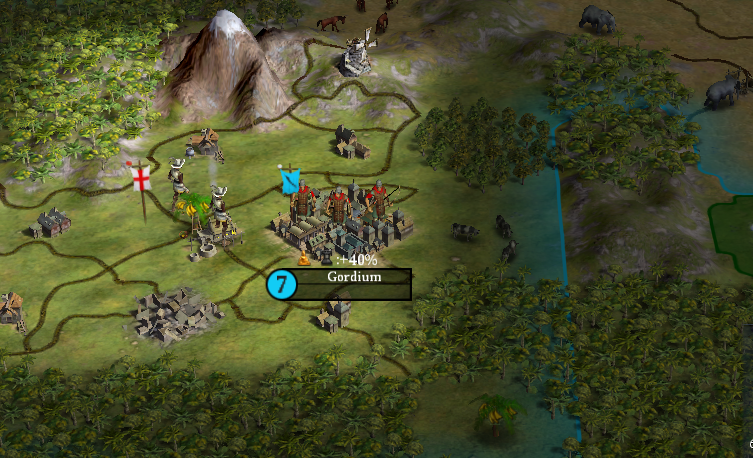
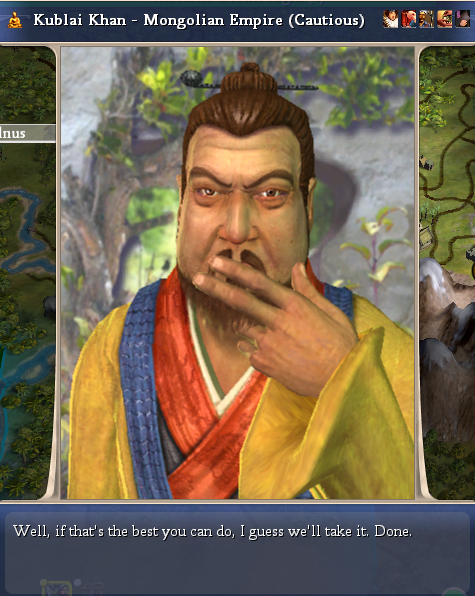 Left; The wealth of Persia. Right; The ambassador from the Golden Horde.
Left; The wealth of Persia. Right; The ambassador from the Golden Horde.During the final years of the thirteenth century and Queen Mary's reign, a case grew that should ships capable of crossing the ocean with sizeable cargoes be built, trade with the Orient must occur. The wide varieties of foodstuffs already across the ocean were cited, along with the tales of gems in Persia, of incense and vast deposits of gold in the hills belonging to the (aptly named) Golden Horde. Queen Mary disagreed.
But Queen Mary never saw the fifteenth century. She died of pneumonia after nearly fifty full years on the throne. Having no direct heirs the throne passed to the Earl of Branston, who narrowly beat the Duke of Edinburgh in the succession because of strong political support. The fifteenth century saw the beginning of the reign of King James' family; the House of Stewart.

 Author
Topic: Let's Play... SM's Civ 4: The United Kingdom of Great Britain & Aztlan! (Read 12279 times)
Author
Topic: Let's Play... SM's Civ 4: The United Kingdom of Great Britain & Aztlan! (Read 12279 times)
